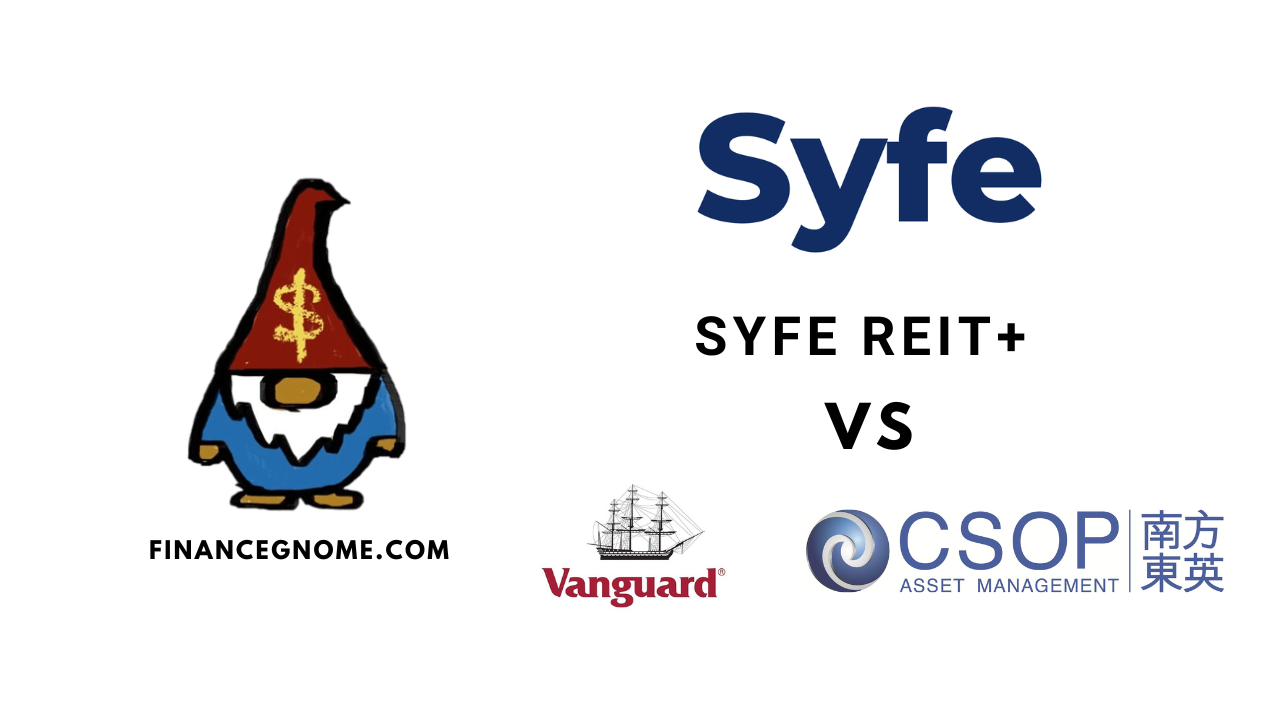Over the past few months, I’ve been looking for the best option (for me) in Singapore to invest in REITs. I wanted a passive, simple and affordable way to gain exposure to REITs. Sector and geography didn’t matter to me. The main objective was to optimise return vs convenience.
I’m not a full-time investor. Between juggling work, family and chilling, I aim to spend only 1 night a week managing the portfolio. So, passive and better yet automated investments fit my aims the best.
Ideally I’d like to minimise exposure to individual REITs. Although SGX-listed REIT ETFs appear to underperform S-REITs (see my previous post here), I find keeping up with individual REITs time-consuming and I’m always annoyed by rights issues.
That said, I’m still gonna retain my existing 2 REITs – Frasers Logistics & Commercial Trust (SGX:BUOU) and Ascott Residence Trust (SGX:HMN).
The options I considered for our REIT exposure in the family portfolio:
- Vanguard Real Estate Index ETF (VNQ)
- CSOP iEdge S-REIT Leaders Index ETF (SGX:SRT)
- Syfe REIT+
Vanguard Real Estate Index ETF (VNQ)
Currently VNQ is my largest real estate holding in the portfolio. VNQ is listed in the US and made up exclusively of US REITs. Since the US is the largest country in the world both by GDP and stock market capitalisation, gaining exposure through the US gives me exposure to a large part of the global real estate sector.
The main downside of holding VNQ outside of the US is the withholding tax of 30% incurred on dividends, which reduces the total return substantially. After tax, VNQ’s dividend yield is only ~2% compared to REIT+ yield of 4.8% (2021).
Read also my previous post comparing REIT+ vs VNQ here.
CSOP iEdge S-REIT Leaders Index ETF (SGX:SRT)
The main reason to consider SRT vs REIT+ is that they both track the same index, i.e. iEdge S-REIT Leaders Index. SRT is also an ETF listed on SGX, thus trades can be executed instantly anytime the stock market is open and through any broker with access to SGX.
The drawback might be transaction costs since I’m DCA-ing every month from my regular pay check. Since the investment amounts are small, transaction costs can make up a pretty huge chunk.
Syfe also wrote a detailed article comparing REIT+ and SRT here.
Syfe REIT+
Among other things, I like the transparency of REIT+ since every transaction is reported, including any rebalancing triggered by index review. Syfe also allows for scheduled transfers from Cash+ to REIT+ on a monthly basis, which automates the investing process. Syfe’s entry level fee is 0.65% p.a. which is only slightly higher than SRT’s 0.6% total expense ratio.
The main disadvantage of REIT+ would be that buy trades typically take about 1-2 business days to be executed, unlike ETFs which are instantly executed.
Read also my previous review on Syfe REIT+ here.
Closing thoughts
As the title mentions, I’ve decided to direct more funds towards Syfe REIT+. Since I started investing a small amount through Syfe REIT+ a few months ago, I have grown more comfortable with the platform and find the product pretty compelling.
I like the fact that I can schedule bank transfers first to Cash+ and then also schedule transfers from Cash+ to REIT+ or any of Syfe’s other portfolios every month. Dividends from REIT+ are also reinvested automatically. Basically, the entire process can be automated once set up initially.
Currently, I only have around $2.7k invested into REIT+ and contributing $200/month, but I’m thinking of increasing it to $400/month. REIT prices have also recently taken a beating so prices are looking more attractive. I’m down -7.4% on my REIT+ portfolio now, valued at $2.4k as at time of writing.

Going forward, although REITs will have to contend with higher borrowing costs, I think REITs as a whole should be able to increase rents to keep with inflation. By investing in REIT+, I don’t have to monitor individual REITs closely but just focus on macro news.
Follow me on Facebook, Telegram, Twitter and Youtube.
Disclaimer: This is not financial advice. I am not professional financial advisor nor do I work in the finance industry. Anything I write here is purely my personal opinion. Please do your own research and due diligence before investing into anything. All investments come with associated risks. Best to consult a financial advisor if you’re still unsure.
Download my FREE Ebook: How to Start Investing in Stocks for Beginners

For more investing tips, visit my Guide page.
- Standard Chartered Online Trading: Referral link
- FSMOne: Referral code P0267058
- Tiger Brokers: Referral link | Review
- Futu SG (moomoo app): Referral link | Review
- Webull: Referral link
- Syfe Wealth & Syfe Trade: Referral code FINANCEGNOME | Referral link | Review
- Endowus: Referral code J5HPB | Referral link
- CoinHako: Referral link
- Crypto.com: Referral link
- Portseido: Referral link
For more investing resources, see my Referrals page.
Disclosure: This post may contain affiliate links and I may get a commission when you click on the links or open an account through the links, at no additional cost to you. I only recommend products or services that I have personally tried and have found useful.

